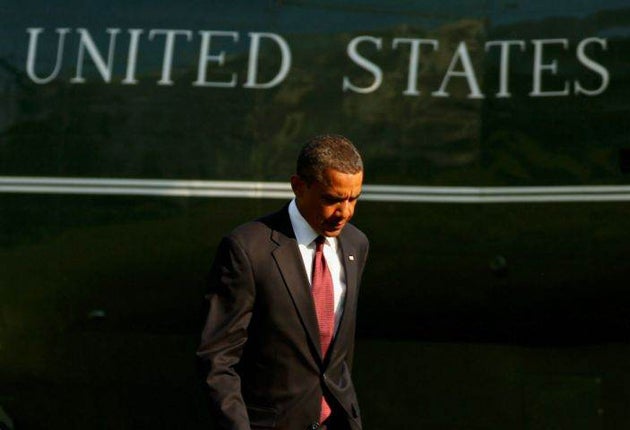Democrats face loss of both House and Senate in 'midterm meltdown'
Polls predict the Republicans are on track to do better than previously forecast

Democrats are heading towards an even heavier defeat than previously forecast in November's midterm elections for Congress, political analysts say. Such an outcome promises big trouble not just for President Obama, but also for Republican leaders as they struggle to run what is likely to be an unruly majority on Capitol Hill.
There has long been scant doubt that, barring a swift and improbable upturn in the economy, Republicans will pick up the 39 extra seats they need to regain control of the House of Representatives they lost in 2006. Now, polls say, they are on track to do better still, and have a reasonable chance of winning back the Senate as well.
The respected Cook Political Report reckons that no less than 68 of the 256 House seats currently held by Democrats are at "substantial risk", compared to 58 in June, with, at most, 10 Republican seats in danger. A similar picture emerges from the latest "Crystal Ball" survey by Professor Larry Sabato of the University of Virginia, which projects a net gain for Republicans of 47 seats, translating into a comfortable majority of 226 to 209.
In the Senate, the Republican target of a gain of 10 to overturn the current 59-41 Democratic majority, also appears to be inching closer. Analysts now believe Republicans could pick up a net eight or nine seats – and if everything continues to fall their way, they could hit the required 10.
The party got off to a sensational start in 2010, with Scott Brown's shock victory in the Massachusetts seat long held by the late Edward Kennedy. Today, as voter dissatisfaction hardens, two-term senator Barbara Boxer is in a desperately close race with her Republican opponent Carly Fiorina, the former Hewlett Packard chief executive, in normally solidly Democratic California. Another example is Wisconsin, the widely respected Democratic incumbent Russ Feingold is now trailing his most likely Republican challenger in November.
August has tended to be a bad month for Mr Obama. In 2008, he suffered a major wobble in his ultimately victorious White House campaign against John McCain, while in 2009 he lost control of the health care debate as rowdy Tea Party-dominated "town hall" meetings made all the headlines.
If anything, this summer has been worse still, as the economic recovery on which Democrats were pinning their hopes has fizzled. "Successes" for the administration, like the end of combat operations in Iraq, pass largely unnoticed. With unemployment stuck close to 10 per cent, and fears of a double-dip recession growing daily, Mr Obama is being pilloried by Republicans as a profligate "big government" Democrat whose policies have succeeded only in increasing a deficit for which voters now blame this president, rather than the once-reviled George W Bush.
Mr Obama's own approval rating has slipped to below 50 per cent, compared with 70 per cent-plus when he was inaugurated. Even more ominous for his party, a Gallup poll last week found voters preferred Republicans over Democrats for Congress by 51 per cent to 41 per cent, the widest margin in the so-called "generic vote" Gallup has ever recorded. If that lead holds, Republicans will do even better than in the epic 1994 midterm vote, the "Republican Revolution" spearheaded by the fiery Newt Gingrich, when 54 seats changed hands. This year, Democrats may have a clear financial edge, but the enthusiasm – as measured by likelihood of voting – is all Republican.
A 1994-style landslide would make life even tougher for Mr Obama, in ways obvious and less obvious. Clearly he would have no chance of pushing his agenda through Congress; his adminstration would almost certainly be harrassed by investigations launched by Republican-led committees on Capitol Hill, just as the Clinton White House was by the Republican-controlled Congress from 1995.
But if the worst-case scenario for Democrats materialises, life will not be all plain sailing for Republicans either. In 1994, Republicans campaigned on a clear programme, the so-called "Contract with America." This year, they have relied not on a specific alternative platform of their own, but merely on blanket opposition to everything proposed by the Democrats.
In midterm elections, which almost invariably produce a backlash against the party holding the White House, such a strategy usually works. However the new Congress that convenes in January 2011 may be different.
A landslide would send many ultra-conservative, anti-establishment Tea Party-leaning Republicans to Washington for the first time, ready to defy not just Democrats but also their own leaders they regard as part of a detested status quo.
Join our commenting forum
Join thought-provoking conversations, follow other Independent readers and see their replies
Comments